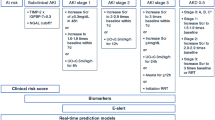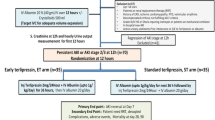Abstract
Objectives: To describe risk factors for the development of acute renal failure (ARF) in a population of intensive care unit (ICU) patients, and the association of ARF with multiple organ failure (MOF) and outcome using the sequential organ failure assessment (SOFA) score. Design: Prospective, multicenter, observational cohort analysis. Setting: Forty ICUs in 16 countries. Patients: All patients admitted to one of the participating ICUs in May 1995, except those who stayed in the ICU for less than 48 h after uncomplicated surgery, were included. After the exclusion of 38 patients with a history of chronic renal failure requiring renal replacement therapy, a total of 1411 patients were studied. Measurements and results: Of the patients, 348 (24.7 %) developed ARF, as diagnosed by a serum creatinine of 300 μmol/l (3.5 mg/dl) or more and/or a urine output of less than 500 ml/day. The most important risk factors for the development of ARF present on admission were acute circulatory or respiratory failure; age more than 65 years, presence of infection, past history of chronic heart failure (CHF), lymphoma or leukemia, or cirrhosis. ARF patients developed MOF earlier than non-ARF patients (median 24 vs 48 h after ICU admission, p < 0.05). ARF patients older than 65 years with a past history of CHF or with any organ failure on admission were most likely to develop MOF. ICU mortality was 3 times higher in ARF than in other patients (42.8 % vs 14.0 %, p < 0.01). Oliguric ARF was an independent risk factor for overall mortality as determined by a multivariate regression analysis (OR = 1.59 [CI 95 %: 1.23–2.06], p < 0.01). Infection increased the risk of death associated with all factors. Factors that increased the ICU mortality of ARF patients were a past history of hematologic malignancy, age more than 65 years, the number of failing organs on admission and the presence of acute cardiovascular failure. Conclusion: In ICU patients, the most important risk factors for ARF or mortality from ARF are often present on admission. During the ICU stay, other organ failures (especially cardiovascular) are important risk factors. Oliguric ARF was an independent risk factor for ICU mortality, and infection increased the contribution to mortality by other factors. The severity of circulatory shock was the most important factor influencing outcome in ARF patients.
Similar content being viewed by others
Author information
Authors and Affiliations
Additional information
Received: 9 August 1999/Final revision received: 24 January 2000/Accepted: 6 April 2000
Rights and permissions
About this article
Cite this article
de Mendonça, A., Vincent, JL., Suter, P. et al. Acute renal failure in the ICU: risk factors and outcome evaluated by the SOFA score. Intensive Care Med 26, 915–921 (2000). https://doi.org/10.1007/s001340051281
Issue Date:
DOI: https://doi.org/10.1007/s001340051281




